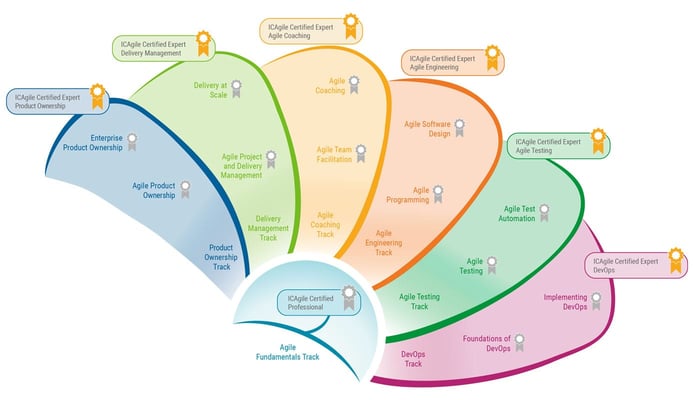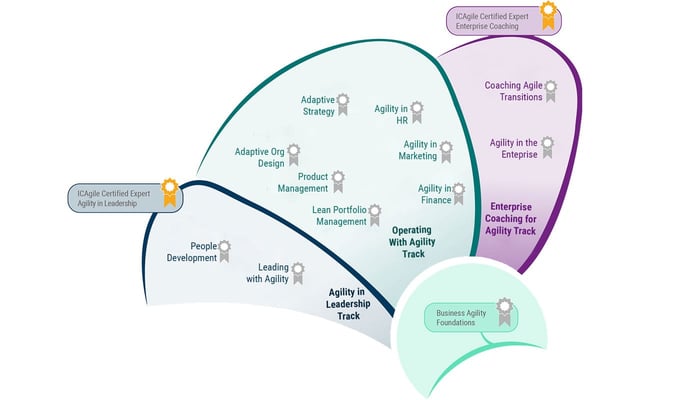
TL; DR: International Consortium for Agile (ICAgile) is an accreditation and certification body on a mission to help training providers and organizations create accredited agile learning experiences. For us in the tech industry, agile is often primarily viewed as a methodology for software development. But this accreditation body views agility differently. They believe agility is not achieved by following prescriptive methodologies or processes; rather, agility is built when it’s grounded in an agile mindset, agile values, agile principles, and manifested through people rather than processes. As organizations look to agile learning to increase business agility, ICAgile’s goal is to advance this emergent field by creating learning standards, verifying competencies, and supporting a culture of continuous learning.
Agile software development is a popular topic here at HostingAdvice, and it’s easy to see why. Agile methodologies were brought into practice soon after the “Manifesto for Agile Software Development” was published in 2001. The manifesto sought to uncover “better ways of developing software by doing it and helping others do it” through its four values and 12 principles. Over the years, it has helped many of the hosting, site-building, and web development companies we’ve spotlighted evolve their products through adaptive planning, early delivery, and continuous evaluation.
But when we zoom out beyond the constraints of our software development bubble, it’s clear we shouldn’t limit agility to the IT domain. In fact, agile concepts can be used to enable positive behaviors and results across entire organizations — not just programmers focused on website building and development.

Shannon Ewan, Managing Director at ICAgile, gave us the inside story on the organization’s mission to make agile learning sustainable.
The folks at the global agile accreditation and certification body, International Consortium for Agile (ICAgile), have recognized this for years and have been working to set standards for effective agile learning accordingly. At ICAgile, agile is not viewed as a process, methodology, or framework. Instead, it is seen as a mindset that embraces uncertainty, welcomes challenges, and positions failures as learning opportunities.
“One of the key things we talk about is starting with a mindset shift and working from there, as opposed to trying to learn tools and techniques,” said Shannon Ewan, Managing Director at ICAgile. “Tools and techniques are important, but you have to start with a fundamental paradigm shift.”
Advancing the State of Agile Learning Worldwide
ICAgile was founded in 2010 with a mission to advance the state of agile learning across the globe.
“There was a lot of interest in agile learning at the time, and the main certification body was centered on the Scrum framework,” Shannon said. “While Scrum is a valid framework for executing in an agile manner, it is just one aspect of the full transformation that you can achieve. And so ICAgile started with the question, ‘What do people and organizations need to learn in order to achieve sustainable organizational agility over time — and not just learn a new process or framework?’”
ICAgile hit the ground running by working with some of the greatest thought leaders in agile coaching — which quickly became the company’s most popular subject. The company also introduced six learning tracks focused on areas including product ownership, agile testing, and delivery management.

ICAgile focuses on the agile mindset, values, principles, and foundational concepts.
“Since then, we’ve evolved beyond team and program-level agility into business agility,” Shannon said. “That’s really where we’re focusing today, not just on team-level agility, but what organizations need to change, and how they need to evolve, to achieve agility across their entire organizations. The reason we have such a breadth of offerings is that we are looking to serve up what any part of an organization would need in terms of transforming their capabilities.”

ICAgile also provides a Business Agility Learning Roadmap.
ICAgile’s world-class learning tracks are intended to help member organizations create their curricula, but the company’s approach is not tied to any specific agile methodology. The idea is to give training providers and organizations the flexibility to tailor their approach to suit their context.
“It’s really about delighting customers across the board,” Shannon said.
Setting Standards for Business Agility Courses and Expertise
ICAgile uses proven agile learning outcomes to accredit companies and training providers creating business agility and agile delivery courses. Once accredited, these courses can be offered to organizations and individuals who wish to earn professional-level certifications.
“We work through partners that are providing training and consulting to organizations on a business agility journey,” Shannon said. “For us, it’s really about setting standards for developing curricula that are sourced in collaboration with thought leaders from around the world.”
With ICAgile’s stamp of approval, individuals and organizations can be confident that the courses they are taking have credibility and meet quality standards in terms of the content, the way they are designed, and how they are delivered.
In addition to professional certifications and accreditation, ICAgile offers expert certification programs designed to gauge professional competency in a given discipline — a unique offering in the industry. The ICAgile Certified Expert (ICE) certifications, awarded to individuals who demonstrate skill in a given subject area and pass a rigorous review process, are considered prestigious.
For example, ICAgile has an expert certification track for Agile Coaching. Individuals who seek to earn the ICAgile Certified Expert in Agile Coaching (ICE-AC) must earn the two knowledge-based certifications on this track (i.e., ICAgile Certified Professional – Agile Team Facilitation (ICP-ATF) and ICAgile Certified Professional – Agile Coaching (ICP-ACC)) and successfully complete an Accredited Expert Program (AEP).
These intensive programs — offered by leaders in the domain of Agile Coaching — guide qualified candidates on a journey to build and demonstrate competence over time alongside a cohort of peers. Vetted for quality, each Accredited Expert Program enables candidates to sharpen competencies in a real-world setting with ongoing feedback from facilitators and fellow candidates.
Supporting a Culture of Continuous Learning
When it comes to agile learning, Shannon said transformation begins with leadership.
“Part of the reason we have these longer journeys into competency-based certifications is we believe that transformation starts with leadership,” she said. “That’s why on our Business Agility Learning Roadmap we have Agility In Leadership, and then we also have Enterprise Coaching — those are where your agents of change live.”
The company’s Agile Coaching track, which falls under the Agile Delivery Learning Roadmap, is similar in that regard. Ultimately, Shannon said these transformational journeys are about cultural change.
“A dysfunction that we’ve seen over the years is that leaders will want to go agile because that’s the way things are moving, but they’re not willing to change themselves in order to do it,” she said. “So, we look at how to lead through change; how to lead in a way that empowers people and allows them to thrive.”
Over the years, the agile movement has embraced the notion that learning is an ongoing process, not a one-time event.
“It’s really about building that adaptive capability into every element of your organization,” Shannon said. “We try to live that in our organization, and it’s something that we’re encouraging with our new learning programs and partnerships with member organizations. It’s about achieving agility through people, not processes and tools.”
A Mission to Create an Impact in an Evolving Space
As for what’s coming down the pike, Shannon said ICAgile is working to continuously improve upon its existing offerings in a manner that seems quite agile in itself.
“Business agility, in general, is an emergent field right now,” she said. “We’re working really hard to get feedback from the new offerings that we’ve put out into the industry. How do we blend the offerings and package them in a way that’s going to be most impactful to the organizations that are following those pathways?”
ICAgile also aims to remain at the forefront of standards for professional learning.
“Technologies are changing — learning is becoming more self-paced and delivered across multiple channels,” Shannon said. “We’re exploring standards to ensure that as people are innovating, we’re still maintaining the integrity of the learning experience.”
HostingAdvice.com is a free online resource that offers valuable content and comparison services to users. To keep this resource 100% free, we receive compensation from many of the offers listed on the site. Along with key review factors, this compensation may impact how and where products appear across the site (including, for example, the order in which they appear). HostingAdvice.com does not include the entire universe of available offers. Editorial opinions expressed on the site are strictly our own and are not provided, endorsed, or approved by advertisers.
Our site is committed to publishing independent, accurate content guided by strict editorial guidelines. Before articles and reviews are published on our site, they undergo a thorough review process performed by a team of independent editors and subject-matter experts to ensure the content’s accuracy, timeliness, and impartiality. Our editorial team is separate and independent of our site’s advertisers, and the opinions they express on our site are their own. To read more about our team members and their editorial backgrounds, please visit our site’s About page.

